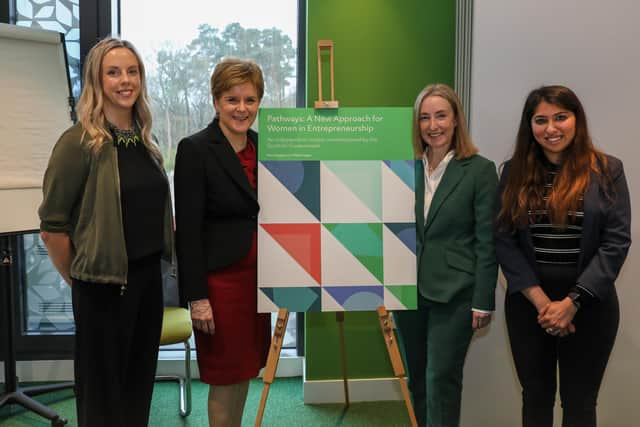Analysis: can Scotland’s newly published Women in Entrepreneurship review really engender transformative change?
But is the 150-page report, titled Pathways: A New Approach for Women in Entrepreneurship, and officially debuted at the start of this week, the right approach to improving female representation when it comes to creating and growing companies?
The study was commissioned last year by the Scottish Government, and has now laid out 31 “specific and directly actionable” recommendations, including clarifying existing access pathways into entrepreneurship, and improving access to start-up and growth finance. It comes after an update published this year to the Rose Review by NatWest boss Alison Rose said support for female entrepreneurs needed to be redoubled, although it also found that more than 150,000 all-women-led companies were founded in 2022 – a record.
Advertisement
Hide AdAdvertisement
Hide AdPathways review chair and lead Ana Stewart – a tech entrepreneur and partner at investment vehicle Eos Advisory – said that study “has, through a combination of extensive stakeholder engagement and robust data analysis, revealed that women face many significant barriers to entrepreneurship”. She added: “By taking a root cause and effect approach, our recommendations focus on dramatically increasing female participation rates to drive a vibrant and fairer entrepreneurial economy.”


However, some organisations working to elevate women in business have, while welcoming the review – which was co-authored by tech veteran Mark Logan, chief entrepreneur to the Scottish Government – also questioned the information used in its compiling and resulting recommendations. The report details how more than 200 direct interviews with organisations and individuals were under taken, and further activity included roundtable events, and an online survey that received 30 responses.
Julie Ashworth, Scotland lead of Women on Boards UK, said the organisation has “some reservations” about the review’s research sample. “Women on Boards UK in Scotland has over 2,000 members from all sizes of businesses, and across a broad range of sectors, not just tech. It is imperative that we see the data from all of the respondents if the report’s recommendations are to support the many rather than the few.”
Urgent
The latter is also a call being made by Women’s Enterprise Scotland (WES), a community interest company working to close the gender gap in enterprise participation, which has called for the full detail on the data shaping the recommendations to be released “urgently”.


WES chief executive Carolyn Currie praised the aspiration to transform women's participation in enterprise, but added: “The review itself says that the investigations have been directed to what are termed ‘the most immediate and visible’ causes, but it doesn't actually say how these causes have been identified and prioritised in terms of action.”
She questions directing women to existing mainstream business support provisions – for example improving access to finance and existing support services – that have proved not to meet the unique needs of women carving out their entrepreneurial paths. And she added that the statistic flagged in the report that just one in five entrepreneurs in Scotland is female has not changed in many years (“that's one of the most persistent gender gaps we have”).
Ms Currie also cautions against treating women as a homogenous, one-size-fits-all group, saying female entrepreneurs are active across all sectors and locations, while there are unique requirements that come with, say, being from an ethnic minority background. The review’s recommendations "need to look at all these different subsets, at all these different intersecting experiences, and align accordingly”.
WES, which last year called for an acceleration of efforts to release untapped female economic potential, has cited research showing that 71 per cent of women’s businesses in Scotland said business support services need to be more aware of women’s needs. Its CEO adds: “I think it's only fair that women are given the legitimacy to design and develop their own support, and have the choice of accessing that support as they start up and grow their businesses. Being able to access a community that is like-minded is really important; it's part of the support structure that helps you get the best out of yourself.”
Call
Advertisement
Hide AdAdvertisement
Hide AdAs well as hoping to realise entrepreneurs’ potential, WES is also continuing to call for the Scottish Government’s commitment of £50 million towards a Women’s Business Centre model to become a reality, a view mirrored by WES ambassador Christine Esson.
The Scottish Business Network boss and co-founder like WES welcomed and contributed to the review, but said she sees additional steps required for its recommendations to “make a positive contribution to the current women’s business support landscape”. She believes design and service delivery “must be undertaken by experts in the provision of gendered support”, and she sees that physical centres to foster female entrepreneurship are “desperately” needed to deliver transformative change. “Time and again, women tell us they need a place of their own, as opposed to being shoehorned into a system which continually fails them.”
Ms Esson added: “I look forward to further positive dialogue around this report and its recommendations ensuring we break down barriers which have led to the under-participation of women in entrepreneurship.” And also keen for further discussion is Catherine McWilliam, nations director – Scotland at the Institute of Directors Scotland, who said: “Constructive dialogue between business and government will be required to ensure the recommended actions are brought to fruition, and we very much look forward to being included in that conversation.”
Ms Sturgeon said the Scottish Government “will respond quickly to the review as a whole, and its recommendations”, while Ms Currie outlines her vision, with goals including a network of women's business centres. “I would like to see women being able to access the support that they have developed, and they've designed in the right environment that is nurturing their business ideas…. and a much more gender-balanced [entrepreneurial] ecosystem to shapen up”
Comments
Want to join the conversation? Please or to comment on this article.